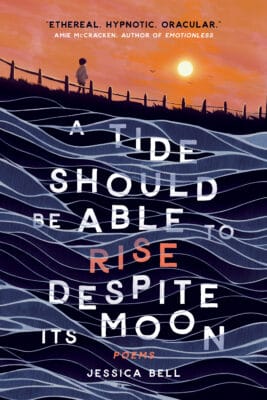April is the cruelest month, wrote T.S. Eliot at the beginning of his modernist classic “The Waste Land.” But what’s so cruel about a time of year that brings a new baseball season, flowers in bloom, and National Poetry Month? For this April, we bring you an interview with poet Jessica Bell, author of A Tide Should be Able to Rise Despite Its Moon. Amie McCracken, author of Emotionless, describes it as “Ethereal. Hypnotic. Oracular.”
Purchase your copy here.

Bell shared her thoughts in a recent interview with Cease, Cows.
Chuck Augello: What should readers expect when they pick up a copy of A Tide Should Be Able to Rise Despite Its Moon?
Jessica Bell: Poetry that is deceptively simple with relatable universal themes.
CA: A favorite line is “My mind is blocked/with snot and mania.” It’s so evocative many readers will recognize that feeling immediately. Is there a particular line from the book that stands out as one of your favorites?
JB: I probably have a favorite line from every poem! But I think I will have to choose this one because it really represents how I feel about myself a lot of the time:
The tall thin tree sits alone in the park
its branches bend toward itself.
The poem this line is from is about feeling disconnected from a parent. But be it a parent, friend, child, fan, audience, or the world itself, I’m sure all creative people would be able to relate to this on some level. I believe it speaks volumes about introversion and how we sometimes purposely retreat from other people and ‘life’ because we feel we don’t ever quite fit in.
CA: The book addresses the experience of parenthood. How does being a poet influence your experience of being a parent?
JB: Oh, I just want to teach my son everything I know! And I also don’t do baby-speak. I’ve been speaking to him like an adult since he was born. He’s 3 ½ and speaks English fluently, has a sense of humor, and is incredibly cheeky! He also likes to sing and narrate his everyday moves which is very entertaining and inspiring.
CA: The book’s title appears as the concluding line in a passage about a failed relationship. It’s a powerful, emotional line. Tell us about it.
JB: Even though I believe that line can be interpreted in many ways, to me, as the title of the book, it is a metaphor for how we should have the ability to be free from the perceived constraints of our world. The meaning of everything in life can shift with a simple and small change of perspective. In the case of the specific poem it’s in, it means that one of the two people involved in the relationship felt that they were being punished because they didn’t meet the expectations of the other party due to closed-mindedness.
CB: Another favorite line is “It wasn’t long ago/when I heard the sound of a smile/the way it eased across my son’s face/ and vibrated the room.” Such a beautiful moment. How did you come to write that line?
JB: It was inspired by a quiet moment between my son and me during downtime before bed one night. We were sitting alone in the loungeroom, on the couch, and I was brushing his hair (it’s long!) asking what book he’d like to read before bed. I couldn’t see his face, but I could just sense him beginning to smile. Everything around me felt different, like the air of the room had had an epiphany. Motherly instinct perhaps? Then he spun around to me, grinning ear to ear, and said, “I have an idea! Let’s watch television!”
CA: You also work as a Publisher and Book Cover Designer for Vine Leaves Press. Do you see a symbiosis between your poetry and your book cover art?
JB: Definitely. Despite everything I do, I think I am a poet at heart. I started writing poetry when I was around 12, which led to songwriting and playing guitar, and then writing prose and longer works. I didn’t start designing covers until I was around 30 years old (in 2011 if you wish to figure out my age. Ha!) I have a book cover design business (Jessica Bell Design) in which I design book covers commissioned to me by indie authors mainly, and some other small presses. When I’m doing JBD work I’m constrained by design briefs, which can sometimes cut off my poetic legs a bit because I have to really hit the mainstream trends in the marketplace. When I’m designing for VLP, I allow myself to become a little more poetic with my designs. Yes, I do market research, but I also follow my gut. VLP books straddle the line between mainstream and experimental, so I like our covers to represent that too.
CA: Who are some of the poets whose work you’ve admired over the years?
JB: Gwen Harwood, Sharon Olds, Emily Dickinson, Anne Sexton, Sylvia Plath, Christina Rossetti. Despite being one of my favorite authors, I still have not read any poetry books by Margaret Atwood even though I’ve been telling myself to for the last 20 years!
CA: There’s no shortage of ways to spend one’s time. What drives you to write poetry?
JB: Me time. It’s my me time.
–
Chuck Augello (Contributing Editor) is the author of The Revolving Heart, a Best Books of 2020 selection by Kirkus Reviews. His work has appeared in One Story, SmokeLong Quarterly, Literary Hub, The Coachella Review, and other fine journals. He publishes The Daily Vonnegut, a website exploring the life and art of Kurt Vonnegut. His novel, A Better Heart, was released in November 2021.

